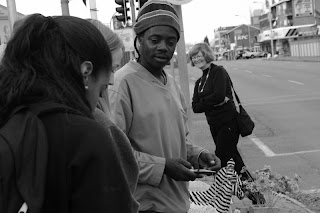 |
| Traditional Dancers at the African craft Market, Johannesburg |
The westernization of Africa is a force to reckon with for the promise of convenience as well as luxury has a strong pull in this continent as well as the rest of the world. What is significant is who is left out of the whole process. As with the USA, the effects of the Apartheid Regime in South Africa are potent and continue to be felt for generations to come. It is unrealistic to undo the racism as well as the systems that supported the privilege of the white population at a very steep cost to the black native South Africans in twenty short years. As our taxi driver drove us to the bus station through the city it was not uncommon to see Black South Africans working with a white foreman standing in observation.
As remarked by our taxi driver, equality has not resulted in a better life for the masses. For the oppressive system did not just segregate, it also limited access to resources for the oppressed. As a result, equality meant that the masses were not prepared, either because lack of education, training, or even the financial resources, to fully participate in the new democracy.
What was significant for me as we rode the bus from Johannesburg, South Africa to Gaborone, Botswana was seeing the effect of the Apartheid land policy in South Africa. The land policy secured most of the land for 10% of the population which was white while squeezing the other 90% of the masses into Ghettos and townships. As an African, I grew up driving through rural areas and enjoying the landscape dotted with homesteads. The South African landscape provided us with views of large tracts of land that seemed either farmed or fenced. Then every so often we would see a Shanty town, a township. The question that crossed my mind was why so many people were squeezed into a small amount of space while huge tracts of land surrounded them.
We crossed the border from South Africa into Botswana in the dark, but I was excited to be in Botswana. An added bonus was the opportunity to see my Aunt who has made a home in Botswana as an immigrant for a while. She and her family moved from Kenya a while ago and have lived and worked in Gaborone. When I walked into her house, I immediately felt at home though I was not in my own home country. To be at home in a strange land is an interesting feeling. Can I count Botswana as a strange land? For although I have not been to Botswana before, it does not feel unknown. Being here is an interesting experience. I look like I belong but also face obstacles in full participation. Language is the major barrier, limiting my participation although I am technically amongst my people.
I was also reminded of the similarities amongst Africans as we rode the bus, from Johannesburg to Gaborone and subsequently to Francistown. Every time we stopped the bus would be filled with hawkers peddling their merchandise; bananas and apples, whole meals of chicken and fries, candy and drinks. To realize that much has not changed in time, as well as location. Twenty years ago, I remember the bus rides and the people that surrounded the buses at different towns, selling similar items. Only that time it was in Kenya. It is amazing to watch the diligence with which they strive to make some sort of living. And somehow, against all odds, they manage to survive and thrive.
Immanuel







No comments:
Post a Comment